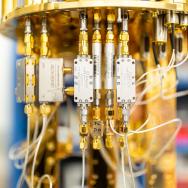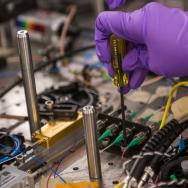The Indian Institute of Technology Bombay (IIT Bombay) and the University of Chicago announced on Sept. 8 a science and technology partnership to promote cooperation in fields such as quantum information science, climate and energy, advanced microelectronics, artificial intelligence and data science. IIT Bombay also has joined the Chicago Quantum Exchange (CQE), headquartered at the University of Chicago, as an international partner.
The CQE announcement was highlighted during a meeting between President Joe Biden and Indian Prime Minister Narendra Modi at the G20 summit in New Delhi, India. UChicago’s new partnership with IIT Bombay reaffirms the goals of the U.S.-India initiative on Critical and Emerging Technology (iCET) to elevate and expand strategic partnership between the two countries’ governments, businesses and academic institutions.
“Engaging in field-defining research at the frontiers of knowledge requires global partnerships. For the University of Chicago, this agreement with IIT Bombay is important not just for the scale that our collaborative efforts will achieve on new and emerging technologies, but also for developing future talent in these fields,” said Juan de Pablo, the Liew Family Professor of Molecular Engineering, and Executive Vice President for Science, Innovation, National Laboratories and Global Initiatives at the University of Chicago.
IIT Bombay has joined the CQE as one of only five international partners. The CQE, an intellectual hub for advancing the science and engineering of quantum information, is headquartered at UChicago and is anchored by Argonne National Laboratory and Fermi National Accelerator Laboratory, the University of Illinois Urbana-Champaign, the University of Wisconsin-Madison and Northwestern University.
News of the IIT Bombay partnership follows recent UChicago quantum-focused announcements in Japan—the first at the G7 regarding a partnership between UChicago, the University of Tokyo, IBM and Google to build the world’s first quantum supercomputer; and the second with Tohoku University to accelerate quantum research. IIT Bombay anchors the Quantum Information Computing Science & Technology (QuICST) Hub, one of the leading centers for quantum research in India.
“Strong global partnerships provide the expertise and resources to advance breakthrough innovation and are an essential part of developing a robust quantum ecosystem. We are very excited to be engaged with IIT Bombay in such a significant way,” said David Awschalom, the Liew Family Professor in Molecular Engineering at the University of Chicago, senior scientist at Argonne, and director of the Chicago Quantum Exchange.
In addition to quantum, UChicago and IIT Bombay will collaborate and conduct joint research in fields such as climate, energy, advanced microelectronics, artificial intelligence and data science. In these areas there will be a host of joint research activities, joint conferences, exchanges of information as well as faculty and scholar visits.
For UChicago researchers visiting India, the University’s Center in Delhi, which opened in 2014, will be a resource for these and similar collaborations.
“At the University of Chicago, our goal is to strengthen collaborations with our Indian counterparts in science, technology and engineering, where the U.S. and India are increasingly aligned in research and development. This partnership with IIT Bombay is an outstanding opportunity to build shared U.S.-India scientific knowledge,” said Supratik Guha, faculty director of the Delhi Center, professor at the Pritzker School of Molecular Engineering, and senior advisor to Argonne National Laboratory’s Physical Sciences and Engineering Directorate.

